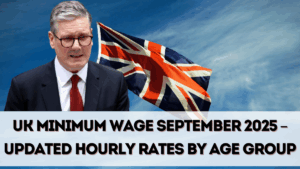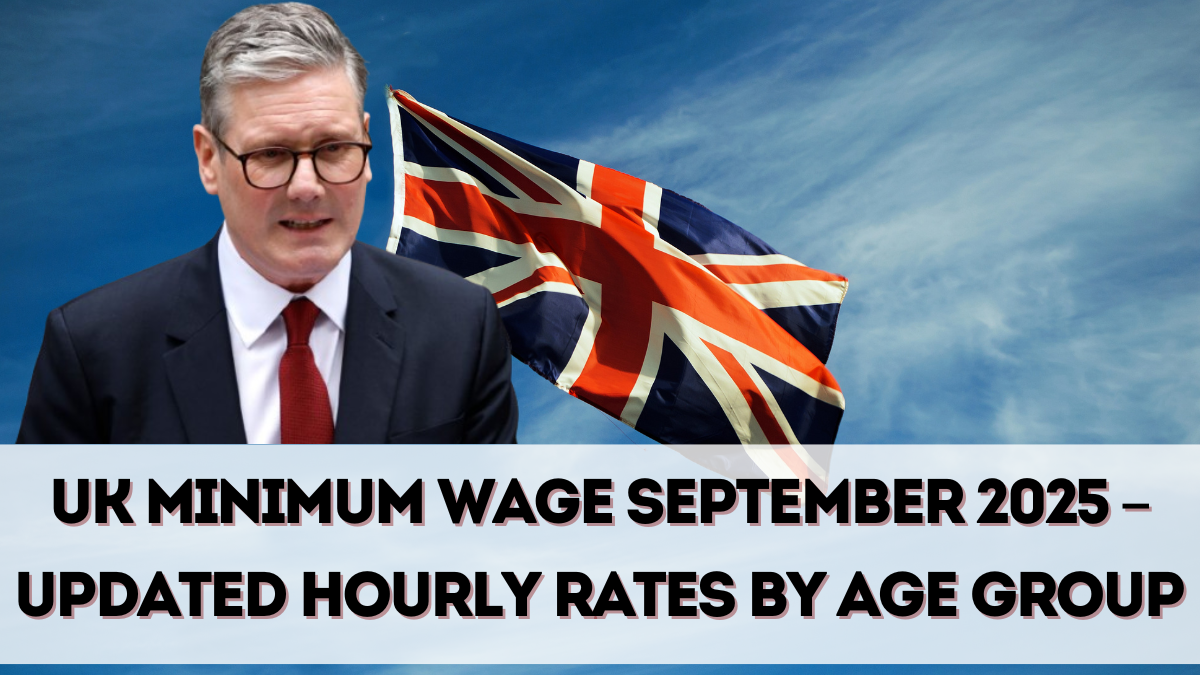The UK government has officially announced the updated UK minimum wage 2025, which will take effect from September 2025. This adjustment is part of the annual wage review carried out by the Department for Business and Trade to ensure that salaries keep pace with the cost of living. For millions of workers across the country, the new wage rates represent a welcome boost, helping households manage everyday expenses more effectively.

Why the Minimum Wage Update Was Needed
The revision of the minimum wage rates was driven by several important factors:
-
Inflationary Pressures: Rising food, housing, and energy costs continue to challenge households.
-
Cost of Living Crisis: Workers earning at the lowest wage levels face the greatest struggles.
-
Fair Pay Movement: Trade unions and worker advocacy groups have long pushed for stronger wage protections.
-
Economic Recovery: With the UK economy stabilizing post-crisis, wage increases are seen as sustainable.
By introducing higher rates in 2025, the government aims to strike a balance between worker welfare and employer affordability.
New Minimum Wage Rates by Age Group
From September 1, 2025, the following updated hourly rates will apply:
-
Ages 23 and above (National Living Wage): £12.20 per hour
-
Ages 21–22: £11.00 per hour
-
Ages 18–20: £9.25 per hour
-
Ages 16–17: £7.20 per hour
-
Apprentices: £6.60 per hour
These changes reflect increases across all categories, ensuring younger workers also benefit from fairer compensation.
Impact on Workers
For employees, the UK minimum wage 2025 increase provides significant benefits:
-
Increased Income: More take-home pay each month helps with groceries, transport, and rent.
-
Reduced Reliance on Benefits: Higher wages can reduce the need for government assistance.
-
Better Living Standards: Workers will have greater financial freedom for savings and leisure.
-
Motivation and Productivity: Studies show wage increases can boost workplace morale.
This update is particularly important for industries like retail, hospitality, and care services, which employ large numbers of minimum wage workers.
Impact on Employers
Employers must also adjust to the new wage structure. The impact includes:
-
Increased Payroll Costs: Especially for small businesses with many entry-level employees.
-
Budget Adjustments: Companies may need to review pricing or reduce expenses elsewhere.
-
Improved Employee Retention: Higher wages help businesses reduce staff turnover.
-
Positive Brand Reputation: Companies paying fair wages are often viewed more positively by consumers.
While some small businesses express concerns about affordability, the government provides support programs to ease the transition.
Enforcement and Compliance
The government has emphasized strict monitoring to ensure compliance with the UK minimum wage 2025 update. Measures include:
-
Random Inspections: Employers may be audited for wage compliance.
-
Heavy Penalties: Companies paying below minimum wage can face fines and public naming.
-
Worker Protections: Employees are encouraged to report underpayment through official helplines.
This ensures fair treatment and prevents exploitation of low-wage workers.
Regional Effects Across the UK
While minimum wage rates apply nationally, the impact differs across regions:
-
London: Higher living costs mean the wage increase may still feel limited.
-
Northern England & Wales: The rise provides stronger relief as expenses are lower than in London.
-
Scotland: The update aligns with ongoing discussions about introducing higher regional living wages.
-
Northern Ireland: Wage enforcement is expected to be stricter due to past compliance issues.
These regional differences highlight why many advocacy groups continue to push for a living wage rather than a simple minimum wage.
How Workers Should Prepare
Employees should take the following steps before September 2025:
-
Review their current contracts to ensure compliance with new rates.
-
Confirm payroll systems are updated by employers.
-
Use the wage calculator provided by the UK government to verify payments.
-
Plan personal budgets around the new take-home income.
Awareness ensures workers fully benefit from the increase.
Long-Term Economic Impact
Economists believe that raising the minimum wage in 2025 will have wider benefits for the UK economy:
-
Increased Consumer Spending: Higher incomes mean more money circulating in the economy.
-
Reduced Inequality: Narrowing the gap between low-wage and average earners.
-
Economic Growth: Greater spending power can stimulate small businesses and services.
-
Potential Inflation Risks: Some analysts warn that businesses may pass on wage costs through price increases.
Balancing these factors will determine the long-term sustainability of the new wage levels.
FAQs
What is the new UK minimum wage in 2025?
From September 2025, the National Living Wage for workers aged 23 and above is £12.20 per hour.
Do apprentices also get a wage increase?
Yes, apprentices will earn at least £6.60 per hour starting September 2025.
How will this affect small businesses?
Payroll costs will rise, but government support programs are available to ease the burden.
Can workers report if they are underpaid?
Yes, workers can file complaints through the HMRC helpline or online services.
Will there be further increases after 2025?
The government reviews minimum wage rates annually, so further adjustments may be announced in 2026.
Click here to know more.
